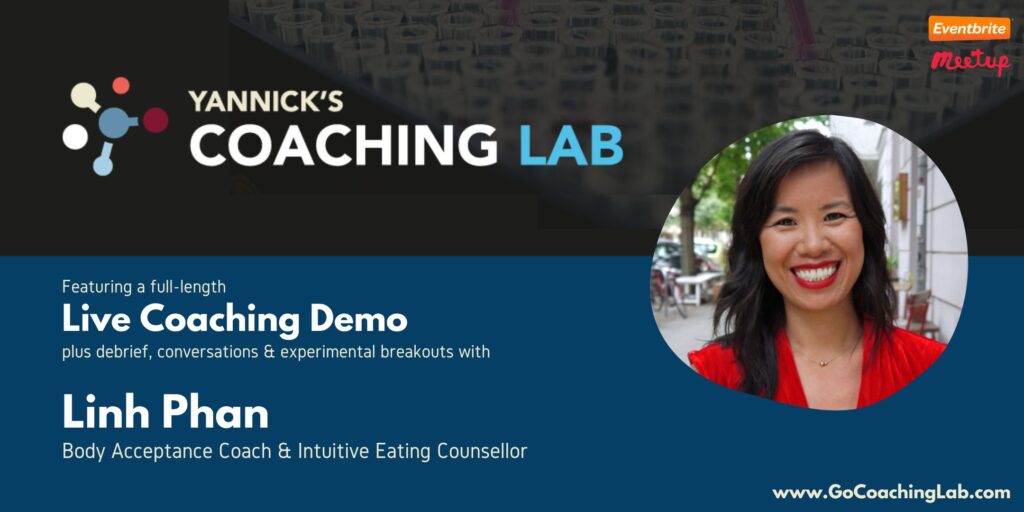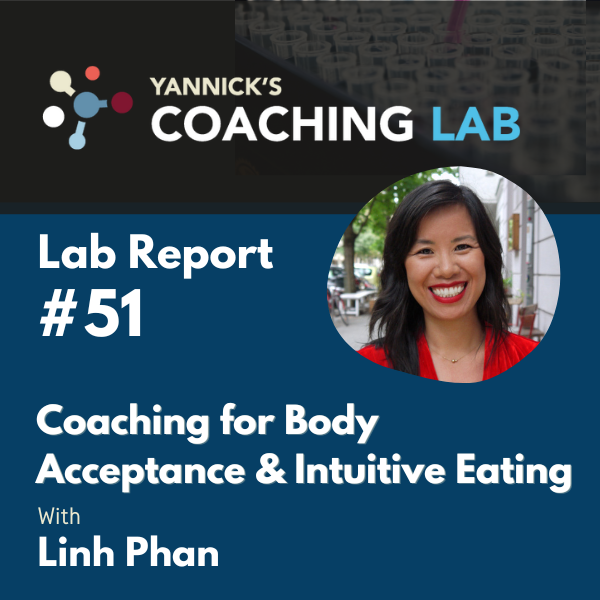
Yannick’s Coaching Lab features guest coaches from a broad variety of approaches, who showcase how they work as part of a live 45min coaching session, followed by reflections and Q&A with the audience.
Curious to know what this session was like? Have a peek at the Lab Report below or consider VIP membership to access the full recording of this and many more exciting sessions.
Yannick’s Coaching Lab #51 — Linh Phan
Lab Report by Natalie Fraser
Session Summary
Linh’s client has had a long-standing ‘thing’ about what they eat. They remember childhood
memories of being a ‘picky eater’ and receiving alterantive menus – possibly related to their
parent’s/father’s lack of will to keep negotiating at the dinner table after a long day
negotiating at work. They have continued to prefer ‘bad food’ throughout their life, although
have had phases of healthy eating.
They reflect that key food influences might be that their metabolism, eating styles, exercise,
and friendship groups have changed during adulthood, more recently becoming a parent,
and not being so in touch with what they eat. Both client and his wife are somewhat
concerned about his health.
Session goals were to experience a “massive” shift in the way he relates to food, or more
realistically make some steps towards creating healthier habits or a different relationship
with food.
The client’s main take-aways were that exploring their relationship with food brought up
related memories and experiences, an awareness of what they already have and have had,
and how they would like to eat more mindfully again.
Key Moments
Session Preparation – Linh and her client had connected briefly about this session to check
in about whether their existing colleague relationship may impact the session, and mutually
agreed that it wouldn’t. No contract was made before the session and Linh was not aware
of what her client would bring. Her only request was to bring along a snack that they usually
wouldn’t allow themselves, to potentially practice some intuitive eating together.
Contracting – Linh began the session by saying that she is likely to take notes, and that it is
unlikely to be a ‘normal’ coaching session which may include education and information
sharing for which she would ask consent beforehand. This consent was given by the client at
this time, who would inform the coach if they were uncomfortable with
questions/information/assessments later in the session.
Breathwork – Linh started with less than a minute of breathing, connecting with the moment
and bringing themselves into the session together.
What would you like to get out of this session? Ideally a massive shift in the way I relate to food. Some steps towards creating healthier habits or a different relationship with food.
Why? – Linh asked her client to elaborate on “why” they would like to make these changes. This was not explored in much depth during the session.
Embodied vs Cognitive – Linh challenged the client’s cognitive exploration, educating that intuitive eating is an embodied experience and encouraging a more detailed description of the ‘process’ of eating.
What goes through your mind while you’re eating? – led to a reflection of the client being “sometimes really tuned in, sometimes really tuned out ‘mindless’”. Later in the session, the client became more aware of the significance of eating passively vs. mindfully.
Judgement words – Linh picked up on judgement words that had been used, and questioned whether judgement occurs whilst eating, which the client shared that he did not. Self-compassion and releasing judgement lies at the heart of Linh’s approach.
Relationship – This theme significantly came up for the client which Linh did not explore, reflecting on their different diets, separate meals, busy lives, and not traditionally cooking together.
Have you noticed a difference in your body depending on what foods you eat? – Led to a discussion of the client’s awareness of more energy with certain foods, yet not a radical enough shift to continue. The client linked this to drinking/not-drinking alcohol.
How do you decide when to eat? Linh asked her client to walk her through a typical day, revealing that routine is varied due to lifestyle, family, and work: simple, quick, little effort, little variety, convenience, reward
Do you think you eat enough during the day? The client reflected that they used to prioritize work, but now eats to procrastinate sometimes
10 guideposts of intuitive eating – Linh reflected that some of these 10 guideposts/principles had come up during the session, and with her client’s consent shared these and began an exploration until the time ran out.
The habituation effect – Linh introduced the idea of the habituation effect, where the novelty of something new runs our after a while, yet moved on when the client shared that this is rarely the case for them, and the novelty doesn’t run out even after long periods of time
Closing – Linh did not hold in mind the session timing, and the client initiated the session closing – both ended the session by sharing some lingering questions and insights.
—
“I don’t know why I’m like this”
“I got into stress eating but that’s a whole other conversation”
“Is it not worth it to me?”
“I don’t know if I can change because I’m just like this”
“this [presence] is my superpower so why am I not doing it?”
are some client statements that were left unexplored and could have opened doors.
Question Linh wanted to ask
– What would it be like to get out of your head and into your body – away from “I know” towards “I feel”
– Invite you to slow down the process of eating, use your senses, eating is not just tasting ‘mindful eating’
– Invitation to notice where your mind is going while you’re eating
Client would like to reconnect with:
– being present with food – build relationship with it, and self through it – be present with it, my superpower
– notice when I’m full
– appreciating that food is given to us by the earth
Insights & Take-Aways
The client walked away appreciative of someone creating space for them to reflect on this topic, didn’t feel interrupted, and felt able to express themselves. The questions were helpful to remind the client what they have already, where they’ve been before.
The client found that the 10 principles could have been very valuable with more time. They appreciated that this process was not forced/prioritized over the client having space to openly explore. They also valued being invited to connect with the principles which stood out to them, rather than being assessed by the coach. “me figuring something out myself lands better than someone telling me something”
Linh often presents the principles at the start of the session then invites clients to explore what stands out, yet found it valuable in this session to understand her client’s history and understand how the framework fits into what they’d already been discussing.
In cases where clients do not connect with any principles, Linh would consider elaborating on the principles to gently nudge them towards exploring this concept yet would unlikely state: you need to work on [this] principle – this urge to highlight areas of focus is something that Linh actively works on as a coach
Intuitive eating is the ‘anti-diet’ – all diets create ‘rules’ and these rules become the focus rather than one’s bodily sensation. This approach attracts clients who’ve engaged in many diets which didn’t work – finding clients can be hard as Linh is against the multi-billion dollar diet industry.
Linh training is not trauma-informed and therefore she is careful to sign-post clients with signs of eating disorders to qualified colleagues.
Linh advocates that food is such an integral part of our lives and becomes interwoven with our identity. Our relationship with food reflects a relationship with ourself.
There are differences in health and differences in how we eat that aren’t related to health. Learning not to judge ourselves for what we eat and why we eat it – being more self-compassionate – is key to intuitive eating.
Our body is a vessel, our body is a home – and there’s so much that we’re not aware of and connected with.
A list of all available recordings can be found at https://bit.ly/LabRecordings
This Lab Report was authored by Natalie Fraser
Natalie is an existential Counselling Psychologist, specialising in trauma and transformation, and curious about coaching. Interested in exploring life’s Big Questions? Find out more at: www.existentialofferings.com

